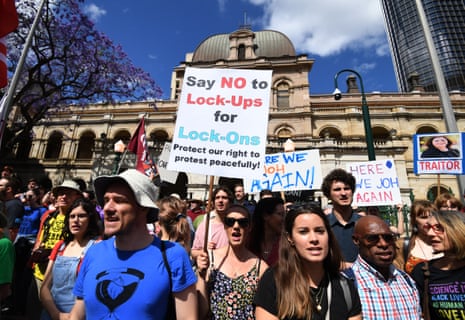The Queensland parliament has passed new laws that will criminalise “dangerous” locking devices used by climate protesters, and give police expanded powers to search suspected activists.
The state parliament gave its near-unanimous support – 86 votes to one – for the controversial measures.
Earlier, MPs voted down a suite of more extreme amendments proposed by the opposition Liberal National party, including mandatory prison terms for second protest offences.
The LNP had also wanted to introduce a new offence of “unlawful assembly” for gatherings of three or more, which could apply in circumstances where a group was suspected of intending to cause traffic congestion.
Those amendments gave the Labor government – whose proposals had been opposed by human rights advocates, unions and many grassroots party members – the opportunity to pitch its position as relatively moderate.
“I believe that means we’ve found the sensible middle of this debate,” the premier, Annastacia Palaszczuk, told the parliament.
Notably, several prominent Labor left MPs chose not to speak during the debate.
Out of interest, here are some senior Labor Ministers who didn't speak on the protest laws bill:
— Michael Berkman (@mcberkman) October 24, 2019
- Jackie Trad
- Mark Bailey
- Mick De Brenni
- Leanne Enoch
- Steve Miles
Since announcing the proposals in August, the government has maintained that the new laws related to disruption caused by recent Extinction Rebellion protests and claimed they were necessary because of the way activists had deployed “locking devices” in a dangerous manner.
The evidence presented by the government to back its claims has continually failed to connect those threads when subjected to scrutiny. Photographs of activists deploying the banned devices in a supposedly dangerous manner – submitted by police in support of the legislation – appear to be from unrelated protests more than 18 months ago.
The government used cabinet confidentiality to keep secret the dates, times and locations of those photographs despite being under pressure to back its most severe claims that activists were using “sinister” tactics, including lacing devices with booby traps like butane canisters, in a way that was designed to harm emergency services workers.
Some of those claims have been debunked, though they continue to be repeated in media reports. Other claims have never been supported by verifiable facts.
Labor MPs who spoke in parliament maintained their rhetoric that protesters who use locking devices were “extremists”, but at the same time sought to address the growing civil liberties concerns, stressing the laws were not designed as an attack on protesters.
“Let me make this very clear, my government is completely committed to peaceful protest and to other fundamental rights,” Palaszczuk said. “These rights are fundamental to the functioning of our democracy.”
The Greens MP, Michael Berkman, was the only MP to vote against the laws.
He said the parliamentary debate had underscored a key concern about Labor’s laws – that any moves to restrict protests would legitimise a more extreme approach from a future conservative government.
“(Labor) has invited just this kind of more egregious political overreach by the LNP,” Berkman said.
“By blindly obeying the Courier-Mail, Labor has started a pointless culture war with the LNP that it can’t win.
“The LNP’s amendments were even worse than Labor’s bill, and this kind of slippery slope is exactly what we’ve been trying to warn them about.”
